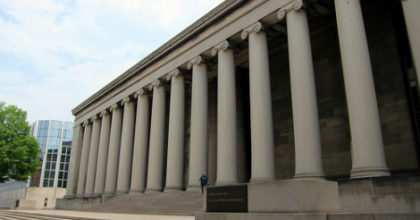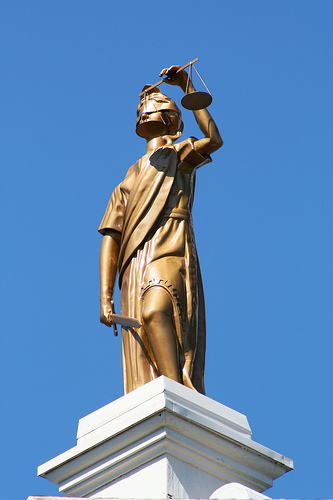
 )
)Are definitions descriptive or prescriptive? That’s a classic conversation about language. I enjoyed this recent Twitter exchange that encapsulates the discussion well.
Neil.
— Merriam-Webster (@MerriamWebster) April 13, 2018
Neil deGrasse Tyson seems to come down on the prescriptive side, or at least would prefer that meanings remain static. Most dictionaries, including Merriam-Webster, aspire only to describe how we use and have used them. Dictionary editors don’t want to be in the business of legislating linguistics, or indeed even policing who is allowed to innovate. Fun fact: it’s predominantly teenage girls, which means I’m about 18 months away from having a front row seat to the latest in language.
One can ask the same question about the laws of nature. Are there laws that prescribe how the world behaves, or are what we call the laws of nature simply our descriptions of the behavior we observe? As our blog discussion book When Science and Christianity Meet comes to a close, Ronald Numbers takes up the topic of natural laws. Essentially, he’s summarizing the trajectory of western science and thus the book as a move away from explanations invoking supernatural agency and towards explanations in terms of regularities and principles. Possibly because the the scientific revolution coincided with reappraisals of governance, we called those regularities and principles ‘natural laws.’ Like laws, they demark boundaries on what is and isn’t possible. And since they apply to nature, they must be natural laws.

 )
)Unfortunately, the language of natural laws may lead us down a garden path. While the metaphor might imply a necessary role for God as the lawmaker, it may also leave him with little to do on an ongoing basis. If nature just follows the laws set out for it, where is God’s place in the present? After boarding that train of thought, some eventually wonder if God has any place at all. At the very least, natural laws sound like they have their own separate, possibly necessary existence apart from God, an intermediate layer between God and his creation.
As Numbers points out, we don’t have to think of science in this way. Instead of thinking of science as divining a set of natural laws that prescribe the behavior of the cosmos, we can think of science as describing God’s activity. That the behavior of creation is regular and repeatable speaks to the constancy of its Creator. “Natural” causes don’t have to be the opposite of “supernatural” agency; nature can be what God does, as Augustine put it.
Theologically, removing the idea of natural laws as some kind of intermediary between God and creation makes sense to me as more consistent with the Bible. One thread of the Biblical narrative depicts God drawing us away from a mediated relationship and into a closer, more direct experience of himself. The most significant milestone in that journey is of course when God walked among us incarnate as Jesus of Nazareth. And the fullest realization of that direct experience is yet to come. In between, God takes other opportunities to remove barriers between us and him, barriers that oftentimes we have erected. So I find it easier to conceive of divine activity in a way that involves as few intermediates as possible, while still maintaining a distinction between Creator and creation.
Is that a case of me adapting my theology to accommodate science? Maybe it is. Fair or not, the history we’ve been reading about seems to lean towards theology having to add nuance in response to science rather than the other way around. Perhaps that means scientists are to the realm of ideas what teenage girls are to the realm of language. They innovate because they work on the boundaries of human interaction with creation. Their innovations can be confusing or uncomfortable for anyone not near that boundary, because the changes seem arbitrary and unnecessary. Ronald Numbers, David Lindberg and their contributors faithfully document that confusion and discomfort in a number of meetings between science and Christianity–really between scientists and Christians. They also show how discomfort can lead to growth, as details that seemed necessary are revealed to be contingent. If that history is any indication, we can continue to look forward to opportunities to grow when science and Christianity meet again.
We’re having one more video chat to wrap up our discussion of this book. I hope you can join us tonight (4/25) at 7:30pm Eastern.
Andy has worn many hats in his life. He knows this is a dreadfully clichéd notion, but since it is also literally true he uses it anyway. Among his current metaphorical hats: husband of one wife, father of two teenagers, reader of science fiction and science fact, enthusiast of contemporary symphonic music, and chief science officer. Previous metaphorical hats include: comp bio postdoc, molecular biology grad student, InterVarsity chapter president (that one came with a literal hat), music store clerk, house painter, and mosquito trapper. Among his more unique literal hats: British bobby, captain’s hats (of varying levels of authenticity) of several specific vessels, a deerstalker from 221B Baker St, and a railroad engineer’s cap. His monthly Science in Review is drawn from his weekly Science Corner posts — Wednesdays, 8am (Eastern) on the Emerging Scholars Network Blog. His book Faith across the Multiverse is available from Hendrickson.

Leave a Reply